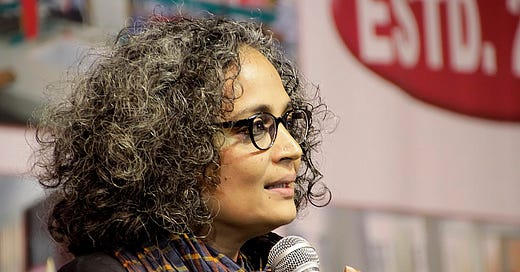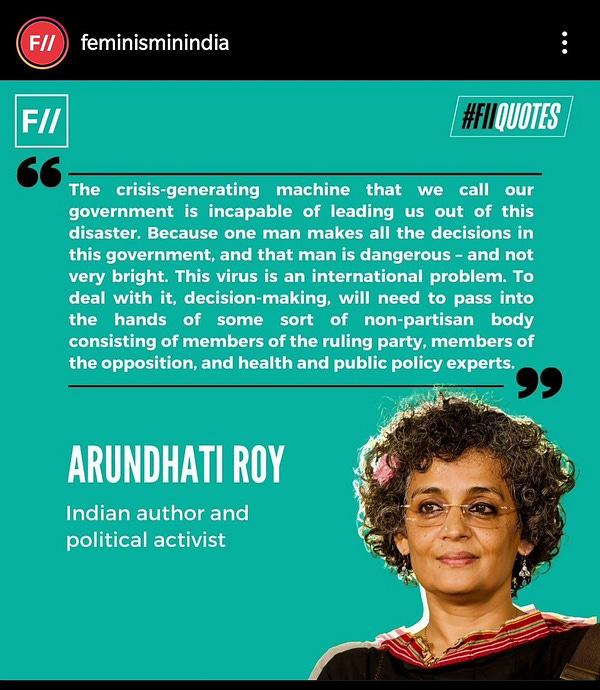Nonsensical Nemo’s Note: I love Arundhati Roy. Probably not in the same way most people do but it’s like reading The Wire with a dash of magic realism thrown in.
Recently, Ms Roy asked for democracy to take a break. Ergo, it’s the perfect time to replug an old classic.
One of the deepest ontological questions that has bothered scientists since the dawn of time deals with the word Amit Shah popularised in 2019 - chronology. Which came first – the Big Bang or Arundhati Roy crying ‘genocide’?
Even as a child, this writer has two distinct memories of dissent – one of Medha Patkar fasting and two of Arundhati Roy, crying ‘genocide’.
Roy’s cries have transcended all physical constraints and become ephemeral, something that exists untouched by reality, flow of time, circumstances or governments. Genocide is the only constant.
If one were to seriously accept Roy’s laments over the years about genocide in India, there shouldn’t be a single individual from minority communities around let alone at least 240 million of them including Muslims, Christians, Sikhs, Jains and others.
Roy surfaced recently, this time on Germany’s international broadcaster Deutsche Welle (DW), claiming that the coronavirus pandemic had resulted in the situation approaching ‘genocidal’.
She also claimed among other things that the Delhi riots were a ‘massacre’, carefully omitting the count of Hindus who died. It’s not a particularly new playbook.
In an article for Scroll she had brought up yet another ‘massacre’ – this one from 18 years ago – that was on a ‘much larger scale’ and went on for weeks.
Speaking of the 2002 Gujarat riots, Roy had written in a piece for Outlook “The mob broke into the house. They stripped his daughters and burnt them alive. Then they beheaded Jafri (former Congress MP) and dismembered him.”
Except, as BJP Rajya Sabha MP Balbir Punj pointed out, the late Jafri’s daughters didn’t live in Gujarat – something that was also corroborated by his own son.
As Punj noted: “When a reputed weekly like Outlook publishes a Booker Prize-winner, it is meant to be serious commentary.”
Roy justified this by stating, that ‘other genuine errors in recounting the details of the violence in Gujarat no way alters the substance of what ‘journalists, fact-finding missions or writers like myself are saying’.
Another instance saw Roy describe a friend of a friend called Sayeeda, who was allegedly caught by a mob in Baroda whose ‘stomach was ripped open and OM carved into her forehead’. The Gujarat Police were unable to find any such instance or person.
She has also said that ‘no one knew who burnt a train full of pilgrims’, alluding to the Godhra train burning, even when a court of law has actually handed out sentences.
In recent times, she erred when attacking the current dispensation over the alleged irregularities of the Rafale deal by calling the fighter jet a ‘carrier’!
Almost two decades later, Roy’s tactics continue to be used by others. Notably, US politician Alexandria Ocasio-Cortez recently defended the idea of being economical with the truth, by claiming it was more important to be ‘morally right, than factually correct’.
In Roy’s book Listening to Grasshoppers: Field Notes on Democracy, she opposed India’s policies towards both nuclear weapons, industrialisation and economic growth claiming, all of them were ‘encrypted with genocidal potential’.
A 2009 Economist review of the book states: “It is impossible not to admire Arundhati Roy. Despite her flawed reporting and analysis, her left-wing prejudices and one-sided portentous writing, the author who carried off the 1997 Man Booker prize for her novel, “The God of Small Things”, is just the sort of brave and energetic critic that India needs.”
This is what boggles the mind. The Western media’s fascination with Roy. The academic citadels and media ivory towers, who seem to believe Roy is the ‘brave and energetic critic India needs’ despite her ‘flawed reporting and one-sided portentous writing’, which would have gotten a beat reporter covering civic body issues fired.
Much like knowledge of English entails lack of any other tangible skills in Indian journalism, does flowery language mean one can be economic with basic facts?
While the world appears to have woken up to the dangers of fake news, whether it’s to tamper with elections or spread lies during a pandemic, the same outlets give the Roys of the world space, without once checking the facts or her past misdemeanours.
While we constantly write off sources of fake news, whether it’s BJP IT Cell chief Amit Malviya, or even PM Modi when he is being economical with the truth in Parliament, why does Roy get a free pass?
A long time ago, Aatish Taseer, who is persona non grata now, had claimed Roy would become friends with anyone who could be seen as a credible threat to India, lamenting that what she said was neither ‘provocative nor new’ but perfectly ‘banal’.
He had written: “The jihadists, the Maoists, the Kashmir movement, the anti-development people... they are all her friends. Anyone who can prove a credible threat to the future of India is her friend.”
Taseer no longer subscribes to these views, claiming they were from ‘gentler’ times.
Perhaps both the publishing world and real one would have been better if Arundhati Roy stuck to writing fiction.
Any individual blessed with the ability to read English will recognise that Roy was perhaps the most naturally gifted writer in the English language from the subcontinent since Salman Rushdie.
Roy should've stuck to writing fiction instead of creating fiction in news.
That febrile imagination would’ve been better served creating genocidal maniacs in a Rowling-type literary tour de force than imagining genocides in the real world.






I love your piece but I don't agree with what you say about her being the most gifted writer in English since Rushdie. She wrote that one book of fiction, which was in fact largely based on her life. It was also perfectly timed to be published for India's 50th anniversary of Independence. So it just checked all the right boxes - Indian, and woman at that!
Helluva piece, guv'nor.
One thing, though: as every fan of Cervantes knows, facts are the enemy of truth.